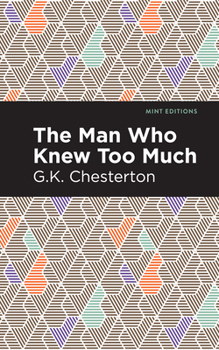The Man Who Knew Too Much
Select Format
Select Condition 
Book Overview
A man of means, Horne Fisher is a well-connected detective who's social and political influence gives him special insight into the underbelly of Britain's elite. G.K. Chesterton uses the protagonist to shine a light on the true nature on the ruling class. In The Man Who Knew Too Much, Horne Fisher leads a collection of short stories that constantly test his morals. He is frequently joined by his partner, a political journalist, named Harold March. Together, they work on various criminal cases often involving murder. Some of the most notable stories include "The Face in the Target," "The Vanishing Prince," "The Soul of the Schoolboy" and "The Bottomless Well." It is a compelling series of suspenseful tales with intriguing characters. The Man Who Knew Too Much was initially published as a serial in Harper's Monthly Magazine, and then as a full collection in 1922. It was also famously adapted for film by Alfred Hitchcock in 1934 and 1956, respectively. With an eye-catching new cover, and professionally typeset manuscript, this edition of The Man Who Knew Too Much is both modern and readable.
Since our inception in 2020, Mint Editions has kept sustainability and innovation at the forefront of our mission. Each and every Mint Edition title gets a fresh, professionally typeset manuscript and a dazzling new cover, all while maintaining the integrity of the original book.
With thousands of titles in our collection, we aim to spotlight diverse public domain works to help them find modern audiences. Mint Editions celebrates a breadth of literary works, curated from both canonical and overlooked classics from writers around the globe.






